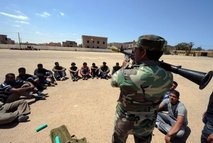Jets screamed in low over Tripoli early Tuesday, carrying out a series of strikes in quick succession, after witnesses reported two others near state media offices a few hours before.
Eight explosions were heard in the capital Tripoli as jets carried out unusually heavy bombardment over roughly three hours.
Four explosions rocked the Libyan capital shortly after 2:00 am (0000 GMT) on Tuesday, shaking the windows of a hotel housing journalists. They were quickly followed by two more blasts.
Late Monday, witnesses reported two explosions in the capital as jets flew overhead, adding that smoke was rising from a site near the offices of Libyan television and state news agency JANA.

The blasts came after NATO chief Anders Fogh Rasmussen said time was running out for Libyan leader Moamer Kadhafi, who "should realise sooner rather than later that there's no future for him or his regime."
Earlier Monday, rebels fighting to oust Kadhafi drove his forces back from around the rebel-held western city Misrata and were poised to make another thrust.
After heavy clashes, the rebels controlled a stretch of coastal road west of Misrata, Libya's third city which Kadhafi's forces have laid siege to for more than two months, forcing thousands to flee.
In all, the United Nations said Monday that nearly 750,000 people have fled Libya since Kadhafi's forces launched an offensive against anti-government demonstrators.
The Red Cross said meanwhile said it delivered a shipment of humanitarian aid to Misrata amid concerns Kadhafi's forces may have dropped mines into the harbour from helicopters bearing the Red Cross emblem.
And the International Organisation for Migration said it had growing accounts from refugees arriving in Italy indicating an overloaded boat carrying up to 600 people capsized off the Libyan coast on Friday.
On the battlefront, the rebels forced Kadhafi's troops about 15 kilometres (10 miles) from Misrata on Monday, advancing to Dafnia and ready to move on Zliten, the next major town on the road to Tripoli, an AFP correspondent said.
Ahmad Hassan, a rebel spokesman in Misrata, said the insurgents had also "liberated" areas south and east of the city, killing many Kadhafi troops and seizing a large amount of weapons. Eighteen rebels and civilians were wounded.
The report could not be immediately verified.
NATO chief Rasmussen said time was running out for Kadhafi, who would ultimately lose his decades-old grip on power given the "wind of change" sweeping the Arab world, the death of Al-Qaeda chief Osama bin Laden and mounting pressure on the Taliban in Afghanistan.
NATO said Monday that its warplanes hit targets and three buildings "hosting active shooters" in the vicinity of Misrata.
It also hit 26 ammunition depots and 16 "vehicle storages" near Hun, eight military vehicles near Brega, two military operational facilities near Tripoli and four ammunition dumps near Zintan.
Meanwhile, 70 representatives from 25 Libyan cities that have remained under the control of Kadhafi's regime, including Tripoli, pledged allegiance to the rebellion in Abu Dhabi on Monday.
"As we continue our support for the 17th February uprising and, in defiance of the regime's claims, we announce unequivocally our allegiance to and trust in the National Transitional Council (NTC)," they said in a statement.
Anti-regime sentiment is also alive and well only 40 kilometres (25 miles) west of Tripoli in Zawiya, which has been under the control of Kadhafi's forces for the past month.
"Kadhafi is a dictator," said one Zawiya shopkeeper who spoke on condition of anonymity, adding he thought that out of the population of the town "95 percent are against the regime."
Another shopkeeper reported that clashes between rebels and regime forces had lasted for four hours overnight between Sunday and Monday.
Because people are afraid, he said, many say they support the Kadhafi regime, but "in reality, 90 percent are against the regime."
But the fighting has been heaviest in and around Misrata, a make-or-break city in the Libyan conflict about 200 kilometres (125 miles) east of the capital.
A thick plume of smoke spread on Sunday over the city, the main source of supplies to rebels in western Libya, from blazing fuel depots that Kadhafi's forces bombed a day earlier.
As long queues formed at fuel stations amid fears of shortages, rebels warned Misrata's residents could run out of food and water within a month if they are not provided with "game-changing" weapons to defeat Kadhafi's forces.
Because of shelling of the city's port over the past two weeks, only one aid ship a week is now reaching Misrata, said a spokesman in the eastern rebel bastion of Benghazi.
The latest shipment of aid to land in the port on Monday morning was carrying surgical kits, spare parts to repair water and electrical supply systems, and 8,000 jars of baby food, the Red Cross said in a statement.
The shipment was laid on by the IOM whose spokesman said meanwhile they were getting a growing number of reports that a ship carrying 600 passengers capsized off the coast Tripoli on Friday.
"Some of those who were shipwrecked managed to swim back to the coast," IOM spokesman Jean-Philippe Chauzy told AFP.
"The witnesses talked of bodies washed up on the coast," Chauzy said, without being able to give a death toll.
Italian coast guards and fisherman, meanwhile, saved all 528 refugees from Libya after their boat hit rocks off the island of Lampedusa in an operation a rescuer described as a "miracle." Among the refugees were 24 pregnant women.
Norway, one of the first nations to offer air assets to the NATO operation, announced it will curb its military contribution if the campaign runs past June 24.
World powers have promised $250 million (175 million euros) in humanitarian aid to the rebels and said the Kadhafi regime's frozen overseas assets, estimated at $60 billion, would be used later to assist the Libyan opposition.
























